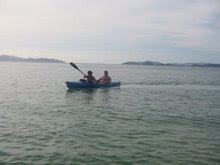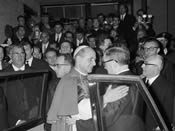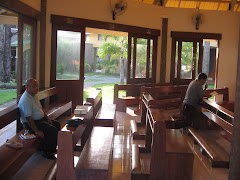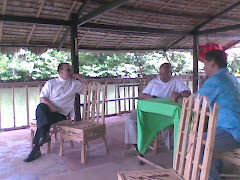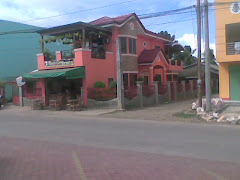PUERTO PRINCESA CITY— On July 2, 2006, the ecclesial award Pro Deo et Pro Populo (For God and For Countrymen) was conferred posthumously on Puerto Princesa’s former Vice-Mayor, Fernando “Dong” Batul, at the Immaculate Conception Cathedral in this City. The award was given during the ceremonies to close the Jubilee which marked the Fiftieth Year of the Palawan Church. His Eminence, Gaudencio Cardinal Rosales, Archbishop of Manila, celebrated Mass with the Palawan clergy on this occasion.
The Certificate of Award, signed by Most Rev. Pedro Arigo, Vicar Apostolic of Puerto Princesa, cites the “heroism” of the former Vice-Mayor in “living the theological and human virtues” as a public servant and media practitioner; the “good example” he presented; his “untiring crusade” for good governance and against the “culture of corruption”; and his having “given up his life for the sake of truth and justice”.
The former Vice-Mayor of Puerto Princesa was also a top-rated radio commentator. He was shot dead by two pistol-wielding assasins while driving himself to the radio station early in the morning of May 22, 2006, two days short of his 37th birthday.
Handbook of Prayers
Video footages of the crime scene (played on global TV right after the assassination) prominently show a copy of the Handbook of Prayers, a prayerbook edited by Fr. Charles Belmonte which is popular among the faithful of Opus Dei. It was on the dashboard of the slain broadcaster’s vehicle at the time he was gunned down.
The former Vice-Mayor had been attending formation-activities given by Opus Dei for some time. He was also known to do the “norms” or prayer-regimen prescribed by St. Josemaria Escriva, the Founder of Opus Dei. These include daily Mass and Communion, daily Rosary, periods for mental prayer in the morning and in the evening, spiritual reading, visits to the Blessed Sacrament, frequent Confession, etc., in hopes of becoming “contemplatives in the middle of the world”, in order to sanctify oneself and others in all the circumstances and events of daily life. Dong also did his annual spiritual retreats with Opus Dei, the last one in December 2005 at the Makiling Conference Center in Calamba, Laguna. He had also been attending weekly Study Circles (he was never absent) as a leading “Cooperator” of Opus Dei in Puerto Princesa City.
In his very last broadcast on May 20, 2006, on the Saturday morning radio program, “Try Ang Gulo” (which he co-hosted with two others), Dong Batul defended Opus Dei and the Catholic Church against the Dan Brown novel, The Da Vinci Code.
While he was yet the Vice-Mayor, Dong met former Finance Secretary Jesus Estanislao, who (with renowned economist Dr. Bernardo Villegas) brought Opus Dei to the Philippines. Dr. Estanislao’s conferences on good governance undoubtedly left an impression on Dong which remained until the former Vice-Mayor’s last days. The last photograph of Dong Batul could well be the one taken at a get-together with Dr. Estanislao on April 9, 2006, when the latter came to deliver the Commencement Address for Fullbright College in Puerto Princesa.
Dong’s attraction to Opus Dei fit in well with the dedication he brought to whatever he did. His drive for excellence found ultimate meaning in an effective desire to become a saint.
Promoting such desires is precisely the mission of Opus Dei. The message St. Josemaria had been propagating since its foundation in 1928 is that everyone is called to sanctity, which means union with God; and that, for lay people, the path to sanctity lies in fulfilling one’s ordinary duties—in the family, at work and in society—with human and supernatural perfection, that is, by doing them well and for love of God. For this, St. Josemaria was dubbed “the saint of the ordinary” by Pope John Paul II who canonized the Founder of Opus Dei in Rome on October 6, 2002.
A large and poor family
The youngest of a brood of seven, Dong had an early education in the value of work. His father, Alejandro, was a carpenter. His mother, Conrada Ulson, sold vegetables in the public market. It was a large and poor family, but also a bright and cheerful home, where everyone was always busy helping each other with some chore.
Like most poor families of native (Cuyuno) stock in Palawan, the Batuls were also a pious lot. The rhythm of family life and work followed that of prayer. Dong had served at one time as Lector at the Immaculate Conception Parish. In 1999, before he entered politics, as a leader in the “Singles” component of the Couples for Christ community, Dong was sent on an evangelizing tour of Israel and the Holy Land.
After finishing his secondary education at the Palawan National School in Puerto Princesa, Dong went to the Palawan State College (now University), also in this City, where he obtained a Bachelor of Arts degree, major in Political Science.
While in college, despite the family’s modest means, Dong managed to qualify for the Varsity Football team and to become Corps Commander of the school’s Citizen Military Training Unit. He was even elected President of the University Student Government!
Upon his graduation from college in 1990, Dong worked as a tricycle driver until he was hired as a clerk at the Crocodile Farming Institute (a foreign-assisted government facility) in Puerto Princesa. He eventually came to head its Public Information Office.
In the middle of the world
While still at the Crocodile Farming Institute, Dong teamed up with a friend from campus politics, Edmond Gastanes, to put up a newsletter, Bunyog Palawan, which provided commentary on public affairs. The project led to a first experience in facing a libel charge. (It was subsequently dismissed by the Department of Justice). It was also around this time, as a volunteer, that Dong started his career as radio commentator. By the time he ran for Vice-Mayor in the 2001 elections, his daily program, “Kulog at Kidlat”, was No. 1 in Palawan. It had also earned him libel charges (later withdrawn).
The decision to run for political office was not an easy one for Dong, not least because of an obvious lack of logistical capability. Nonetheless, he agreed to be running mate to Dennis Socrates, who was aiming for City Mayor of Puerto Princesa. The tandem won in the 2001 elections, on the campaign theme, “New Politics, Good Governance,” for an end to feudal (patronage-driven) politics and its “culture of corruption”. Their tenure in office turned out to be short, however. Socrates was removed by a recall election in 2002 while Dong was unseated (in an electoral protest) by the Commission on Elections a few months later.
Despite these apparent setbacks and without any illusions of winning, the Socrates-Batul tandem ran again and lost in the 2004 elections. According to close supporters, it was more an information-education campaign than anything else.
Immediately after the 2004 elections, the former Vice-Mayor returned to broadcasting. His radio program, “Bastonero”, quickly became No. 1. Dong Batul was at the highest point of his career as broadcaster when he was murdered.
For a first in the entire province of Palawan and its capital city, a phenomenal crowd of 20,000 walked more than four hours in Dong’s funeral procession. (Puerto Princesa has a population of only around 200,000).
The universal call to holiness
The idea of becoming a saint would not have sounded strange to the former Vice-Mayor of Puerto Princesa. After all, the town boasts of a canonized saint among its founders: Ezequiel Moreno, a Spanish priest in the Order of Augustinian Recollects, was chaplain of the 1872 expedition that established civil government in area. He later became Bishop of Pasto in Colombia. Ezequiel died in 1906, and for having lived a holy life was canonized on October 11, 1992. (His feast is celebrated on August 19).
But St. Ezequiel Moreno was a cleric and religious. Through contact with Opus Dei, Dong Batul found clear expression of the truth that, for him and for the vast majority of Christians who are neither priests nor members of a religious order, the struggle for sanctity meant engaging in “temporal affairs” and “directing them according to God’s will” (Lumen Gentium, No. 31). It is in these authentically-human endeavors that the lay faithful of Christ must live the supernatural and moral virtues, to “be perfect” as Christ demands (Matthew 5:48). Dong’s presence in the field of politics and the mass media was certainly worthwhile. –D.O. GLORIA

